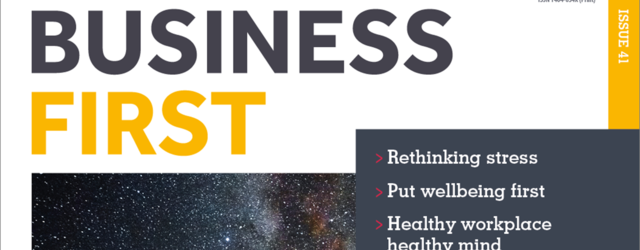
Protecting the mental health and wellbeing of employees is more than just a workplace perk
As such a large part of an employee’s life is spent at work, it’s important that employers play an active role in ensuring that their workers develop and maintain good mental wellbeing and a healthy relationship with their place of work.
This is particularly important post-pandemic, when it is widely acknowledged that employees' health has suffered because of lockdowns, job uncertainty, and the mandate to work from home.
After all, healthy and well-motivated employees will have an equally positive impact on the productivity and effectiveness of a business!

The Great Resignation – how to minimise disruption across your business
One of the most widely publicised phenomena caused by the pandemic is what has now become known as The Great Resignation.
According to a poll undertaken by recruiter Randstad UK in November of last year, almost 7 in every 10 employees (69%) said they felt confident to move to a new job within just a couple of months.

How to avoid an Employment Tribunal
The cost of defending Employment Tribunal cases can vary significantly and could cost your business anything from £10,000 to £50,000. Then if the claimant is successful, there will be the cost of compensation on top of this. The average award for an unfair dismissal case in the UK is a little under £7,000, with claims resulting from discrimination costing significantly more. Businesses also need to consider the hidden cost of employment law claims caused by the damage it can do to their reputation as an employer and as a business that clients and customers want to work with. Often this cost can be more damaging than the award itself.
.

What counts as bullying in the workplace?
Experiencing unfair treatment in the workplace can be distressing and can have an impact on your life both in and out of work. You may be worried about your financial situation if you leave, your performance at work, or suffer from low self-esteem. However, there are laws to protect employees from such treatment, but you must first understand what type of negative treatment you are experiencing under the law. In this article, we look at what bullying in the workplace is, and what you can do if you are a victim.

Employment Law: Age Discrimination in the Workplace
Age discrimination claims to employment tribunals have risen steeply since the pandemic, and a recent case has highlighted the challenge for employers using a mandatory retirement age.

Employee rights – Compulsory Vaccinations Update September 2021
From 11 November 2021, all care home workers and anyone entering a care home must be fully vaccinated, unless they are medically exempt under the Health and Social Care Act 2008 (Regulated Activities) (Amendment) (Coronavirus) Regulations 2021.

Compulsory vaccinations in the care sector
With the Covid-19 vaccine fast being rolled out across the country and all over 18’s to be offered a first dose by the end of June 2021, the Government has now mandated that all people working in elderly care MUST be vaccinated in order to continue to do this work. The new legislation, which is subject to Parliamentary approval, is expected to come into force from October.

Recruitment - How to get it right
In our latest blog Head of Employment Law, Katie Ash, goes through the eight key steps to lawfully recruiting someone into your business. It can be a costly mistake to ignore the rules and get this wrong.

An employer's guide to flexible working
Flexible working has been at the forefront of many businesses since the pandemic began, and for many it is now time to formalise a flexible working policy. This guide tells you how to handle flexible working requests but we can also assist with a policy if required.

Breastfeeding when returning to work: What’s the law?
For many women, returning to work after maternity leave can feel like a daunting prospect and one of the biggest sticking points is in relation to those who continue to breastfeed or express milk once their maternity leave has ended.
Here, Banner Jones’ Head of Employment law, Katie Ash, looks at the state of current legislation here in the UK.

Returning to work after maternity
Handling an employee’s return to work after maternity leave can feel like a bit of a minefield to most employers. Added to this is the risk of expensive pregnancy and maternity related discrimination claims as well as possible sex discrimination and constructive dismissal claims if they get things wrong.

Out of hours communication – do you know the law?
For many business owners and decision makers, the lockdown restrictions introduced as a result of the Covid-19 crisis have provided them with an unprecedented opportunity to review their operations.

Gender Pay Gap Reporting: Your Questions Answered
Over time, the gap between women’s and men’s median hourly earnings has been narrowing. In fact, according to the Office for National Statistics (ONS) it has fallen by over a quarter among full-time employees in the last decade.

The Uber Ruling and the future for the Gig Economy.
On the 20th February 2021, the Supreme Court handed down its Judgment in the long awaited Uber case (Uber BV and Others v Aslam and Others). All six Judges unanimously ruled that the Uber drivers were workers, not self-employed contractors and as a result were entitled to basic employment rights like National Minimum Wage, holiday pay and sick pay.

Redundancy in the hospitality sector: what do employers need to consider?
With the country now in its third lockdown, it is clear that the hospitality sector has been hit the hardest and with no sign of hotels, pubs and restaurants reopening soon, employers in this sector will be almost certainly be facing some tough decisions about their staff in the coming weeks and months.

Skilled Worker Visas: What your HR team need to know
After a lengthy transition period, the UK has now left the EU with a deal agreed. While many possible scenarios have been discussed at length in recent years, until now we have been limited to speculation and conjecture in terms of what the outcome might be. Not to mention how it might affect businesses and, more specifically, employees.

Looking after your workforce- what are your responsibilities for lone workers?
Employers need to protect the mental health of those who work alone. This blog gives you an overview of what you should be considering.

What is the Good Work Plan and why does it matter?
For many, 2020 will go down in history as the year that changed everything, and one of the most significant changes was the way in which we work.

Brexit: supporting your European employees in the UK & British employees abroad
As the UK prepares for the end of the Brexit transition, new laws will be coming into place from 1st January 2021 which will affect businesses, as well as the people who work in them. But what are the expectations on you as an employer?

Your FAQ’s regarding annual leave and Coronavirus
Here, our employment law team cover some of the most commonly asked questions relating to holiday during the pandemic.

Treat redundancy with the respect it deserves
As a business owner, we know you try to plan for every possible situation but unfortunately, nobody could have predicted what 2020 had in store.

Post-Lockdown Planning- What does the future hold for your business?
Over recent weeks there has been a huge amount of emphasis on dealing with the lockdown. Businesses and business owners have worked tirelessly to get their heads around the terms of furlough under the Coronavirus Job Retention Scheme, ensuring staff who need to work can do so remotely, and that the office, factory or other workspace remains safe for those who do need to physically attend the workplace.

Protecting your business and your employees during difficult trading periods
As the country continues to grapple with the evolving situation relating to the Covid-19 pandemic, many businesses and business owners are reacting in real time to the government advice relating to social distancing and non-essential travel.



